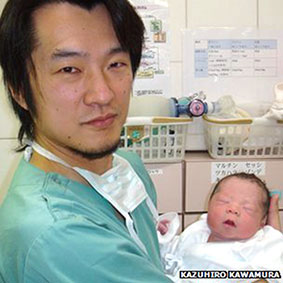New breakthroughs help early menopausal women have children
Young women with early menopause still have a chance to be mothers by the technique of "awakening" the ovaries developed by Japanese and American scientists. The success of the new reproductive support technique, described in the Proceedings of the National Academy of Sciences, is marked by the birth of a baby and a growing baby.
 Normally, eggs in the ovaries are not fully developed, but they are only follicles and only one or several of them are ripe and shed each month, ready for conception. But in people with "ovarian dysfunction" , the rate of "consumption" of eggs is faster. This condition affects 1% of women, causing them to deplete their eggs supply at a very young age, leading to premature menopause.
Normally, eggs in the ovaries are not fully developed, but they are only follicles and only one or several of them are ripe and shed each month, ready for conception. But in people with "ovarian dysfunction" , the rate of "consumption" of eggs is faster. This condition affects 1% of women, causing them to deplete their eggs supply at a very young age, leading to premature menopause.
In the study, scientists from Stanford University in the United States and St Marianna University Medical School of Japan sought to nourish the few remaining follicles of 27 women who were infertile in their 30s due to "decline. ovarian function " . Accordingly, the team separated the ovaries from the body and used a combination of two different techniques to activate immature follicles : first separating the follicles from the ovary, then using a type of chemical Special substances to stimulate development of follicles. Next, experts implanted them back into the female body, at the head of the fallopian tubes and used their hormone therapy.
After treatment, follicles have begun to develop in 8 women and mature eggs are applied to conventional in vitro fertilization (IVF) procedures. As a result, a woman has a baby as expected and another is pregnant.
"Find new ways to create eggs by" awakening " promising " sleeping "follicles that have the potential to alter infertility therapy" , Professor Nick Macklon at the University of Southampton (UK) said. Similarly, Professor Charles Kingsland of Liverpool Obstetrics Hospital and the Royal College of Obstetricians and Gynecologists also appreciate the potential of new technology, but he is not sure it will work for all women. On the other hand, possible complications in menopausal women early on when the follicular feeding method is applied is still unknown, so experts believe that this method needs to be further studied and improved. before it is clinically applied.
For his part, Professor Aaron Hsueh, a research team member at Stanford University, affirmed that the new technique needs to be improved to find the best way to do it, but now it can help around 25-30. % of women get premature menopause."I think the new technique can help two infertile subjects, those who have just cured cancer after chemotherapy or radiation but still have follicles and women aged 40-45 years late. what caused by menstrual cycle disorders , " said Hsueh.
- Menopause 7 years still give birth to healthy children
- Use estrogen is beneficial for cardiovascular in some menopausal women
- Women with premature menopause due to makeup
- Menopausal women are men who are young girls
- Menopausal women are to take care of them
- Women are prone to postmenopausal cancer
- American scientists successfully implanted ovaries
- Should children go to kindergarten early?
- 7 medical breakthroughs in 2017 make sure you are admiring
- Small women are attractive
- Late I make men more stressful than women
- Conception of pregnant women 'eat' children will harm the fetus
 Green tea cleans teeth better than mouthwash?
Green tea cleans teeth better than mouthwash? Death kiss: This is why you should not let anyone kiss your baby's lips
Death kiss: This is why you should not let anyone kiss your baby's lips What is salmonellosis?
What is salmonellosis? Caution should be exercised when using aloe vera through eating and drinking
Caution should be exercised when using aloe vera through eating and drinking